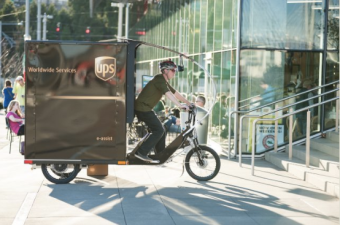Van Jones and the Vision for a New Urban Environmentalism
This morning we’re featuring a post from Streetsblog Network member Where, an always thought-provoking international blog that "brings together urbanists from all walks of life living in cities around the world to poke, prod, and otherwise examine everything urban in an effort to maintain a global conversation about this increasingly vital subject matter."
Today Where is looking at Van Jones, Obama’s green jobs adviser. Jones is a longtime activist and author, most recently, of The Green Collar Economy: How One Solution Can Fix Our Two Biggest Problems. As Where says, Jones advocates the development of green infrastructure as a solution to both urban poverty and global warming:
Photo of Van Jones via Green for All.
In today’s political climate of economic crisis and recovery, this concept makes environmental concern more politically viable. It has rallied unions, corporations, politicians, and local activists behind
alternative energy as an agent for job creation.Still, there is skepticism about the merits of combined solutions to global warming and poverty. Some see a lack of environmental concern among less affluent communities as a major impediment. Others point out that environmental conservation places disproportionate strain on people living in poverty. Some policy experts see the two problems as too distinct to be addressed with a joint solution. Jones responds by explaining the benefits of a holistic approach that encourages combined efforts. He considers poverty alleviation without environmental consideration a short-term fix, resulting in greater problems down the road. He adds that people living in poverty will support environmental causes that address their most pressing needs.
In another interview, Jones critiques the politically expedient allocation of infrastructure dollars:
Well, the people who were global warming deniers, once they came around to believing in global warming, then they said “we’re still for Drill Baby Drill.” And then when that was no longer the
conversation, they became the “we’re for shovel-ready” voices — as opposed to people-ready or planet-ready. So now they want the stimulus to go to “shovel-ready” projects. What are “shovel ready” projects? They’re sprawl-ready projects. Every governor’s got a load of highways to nowhere that they can throw money, contractors, and unions at, and get a lot of political payoff in the short term. But then we’re actually feeding what we’re fighting, if our aim is an energy-independent, climate-smart country. “Shovel ready” gets pitted against green jobs because green jobs will have a little longer turnaround, in terms of training people, getting regulations in place, making sure companies are ready to go.
Elsewhere around the network, Baltimore Spokes argues that motorists will never understand a biker’s point of view unless they ride the roads on two wheels themselves — and that doing so for at least 100 hours should be a requirement for a driver’s license.
